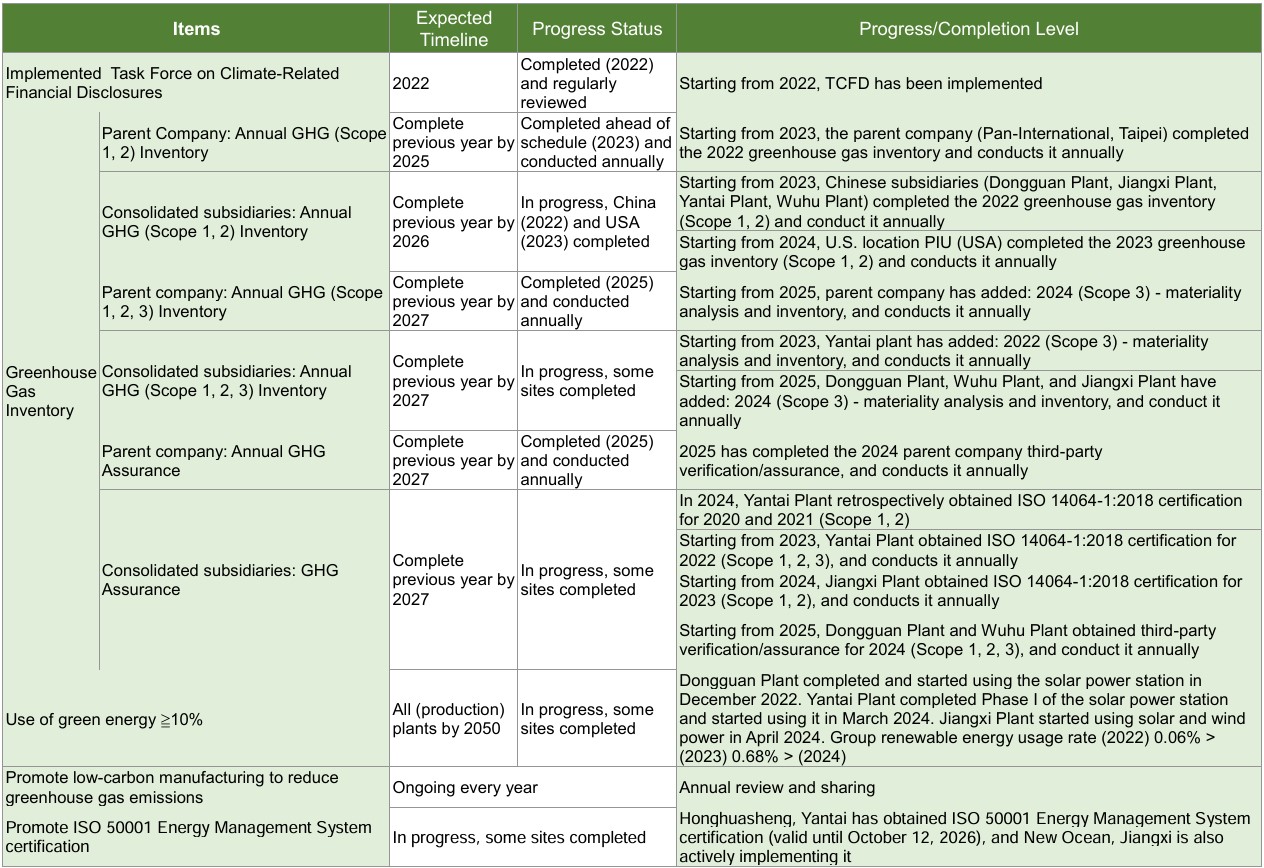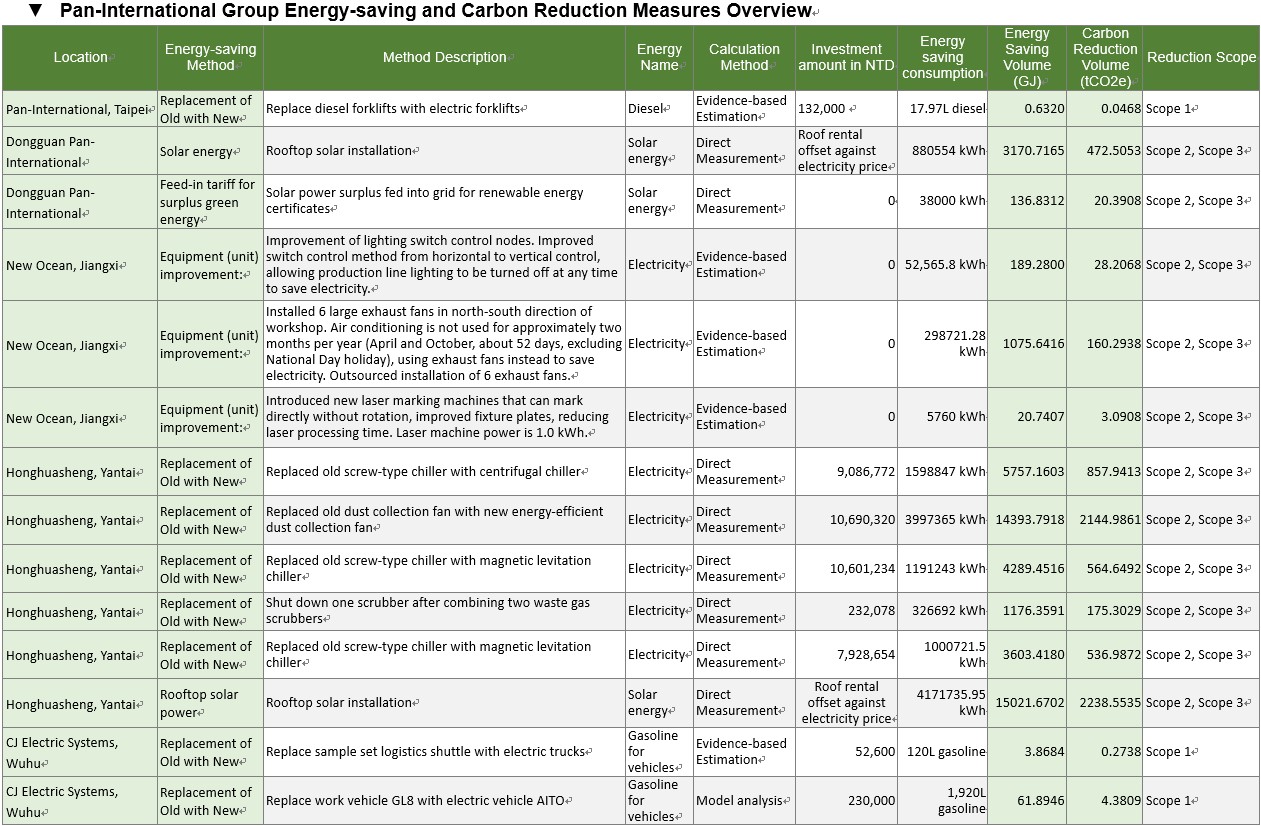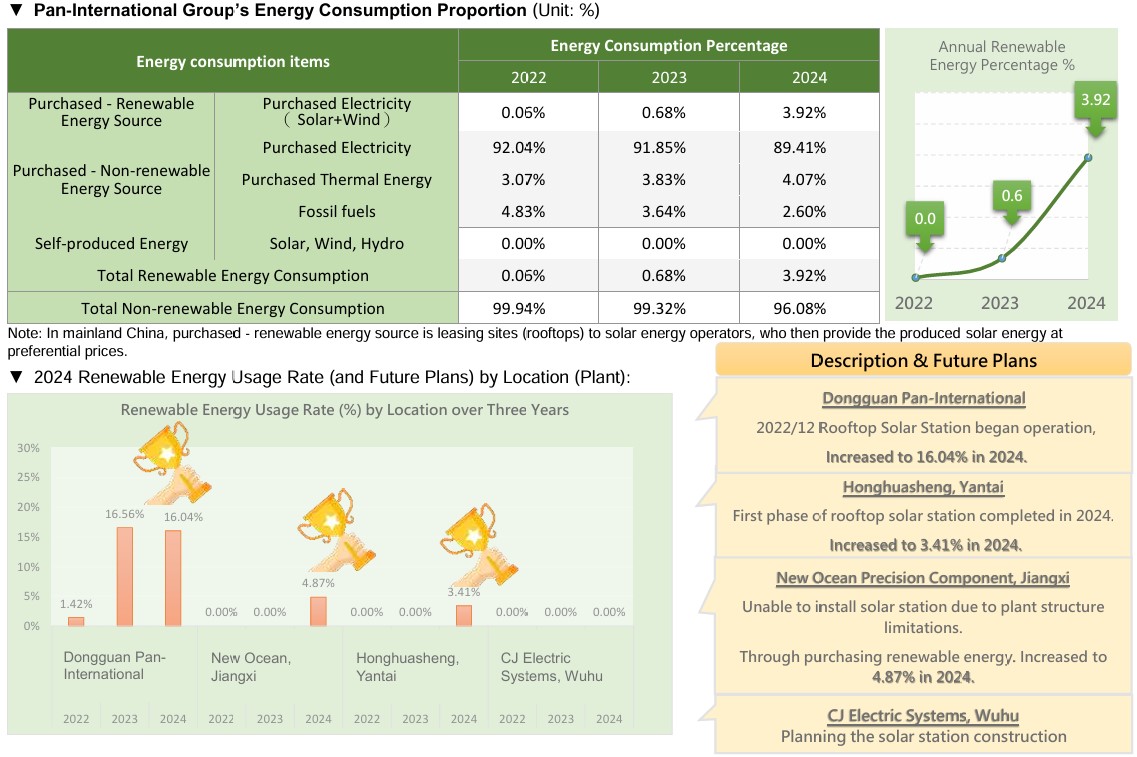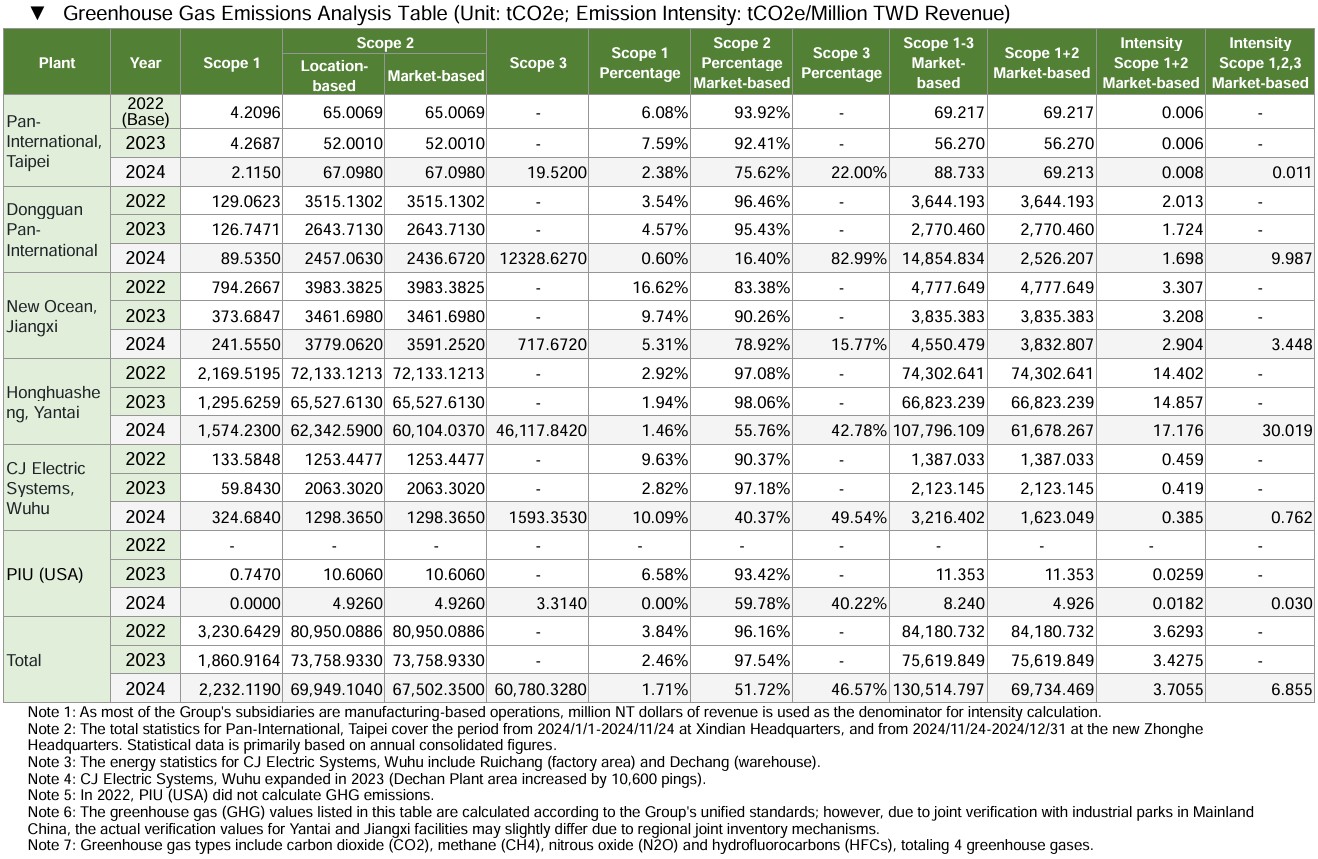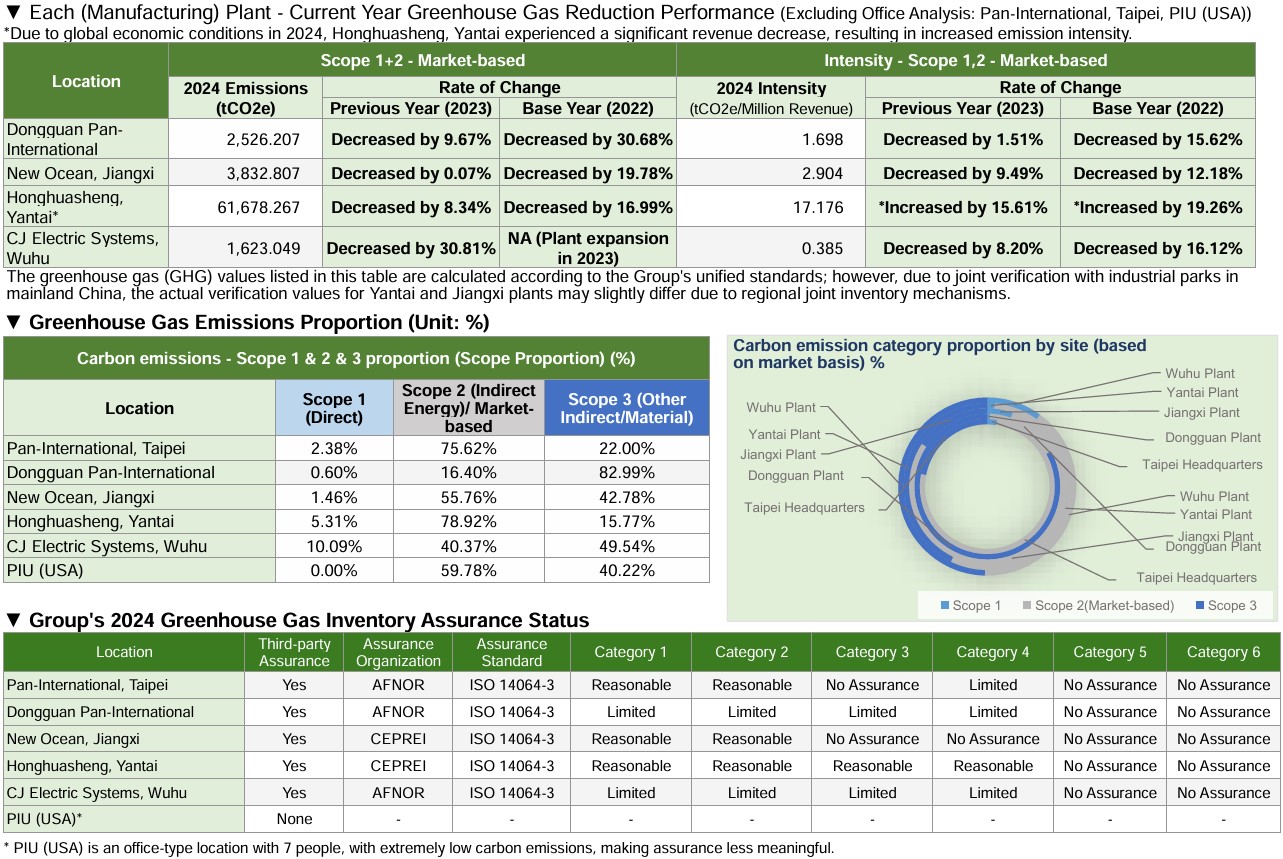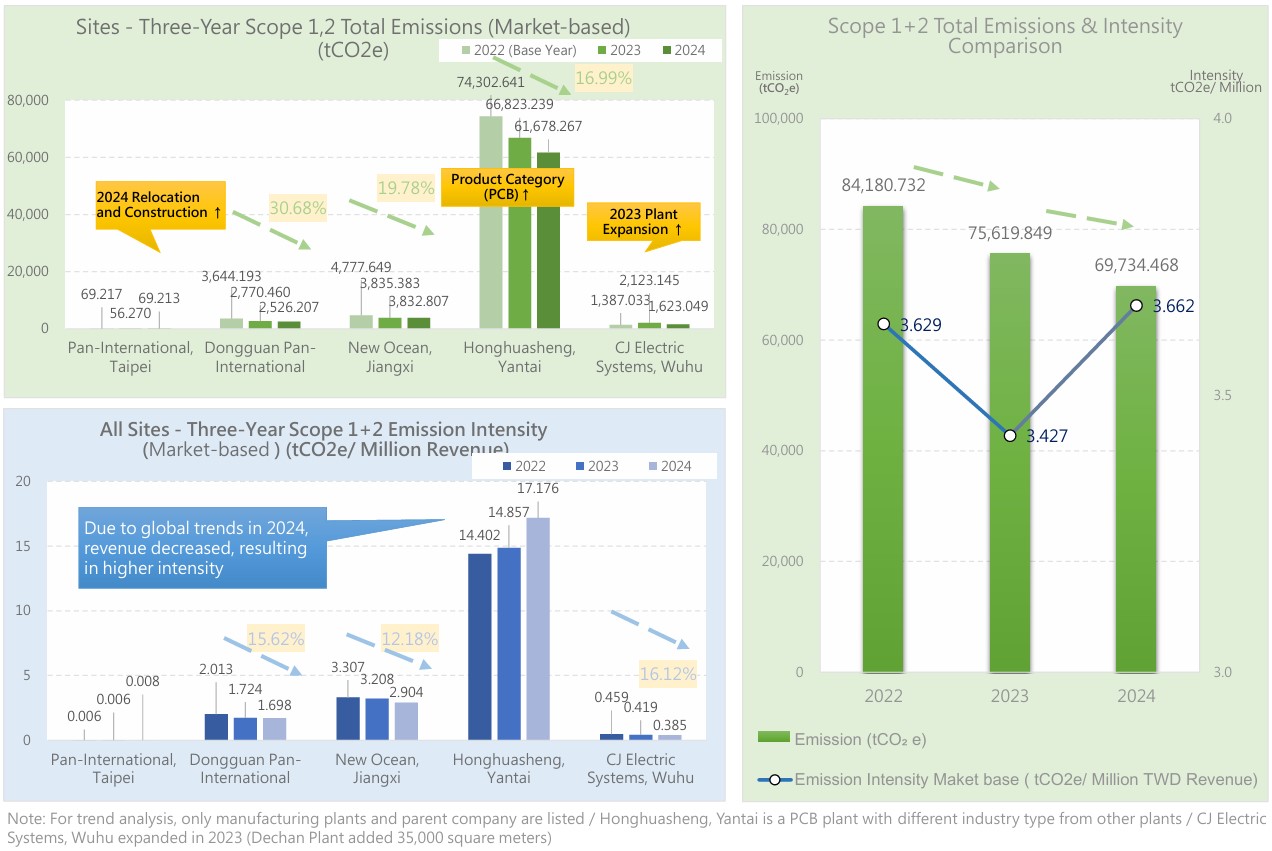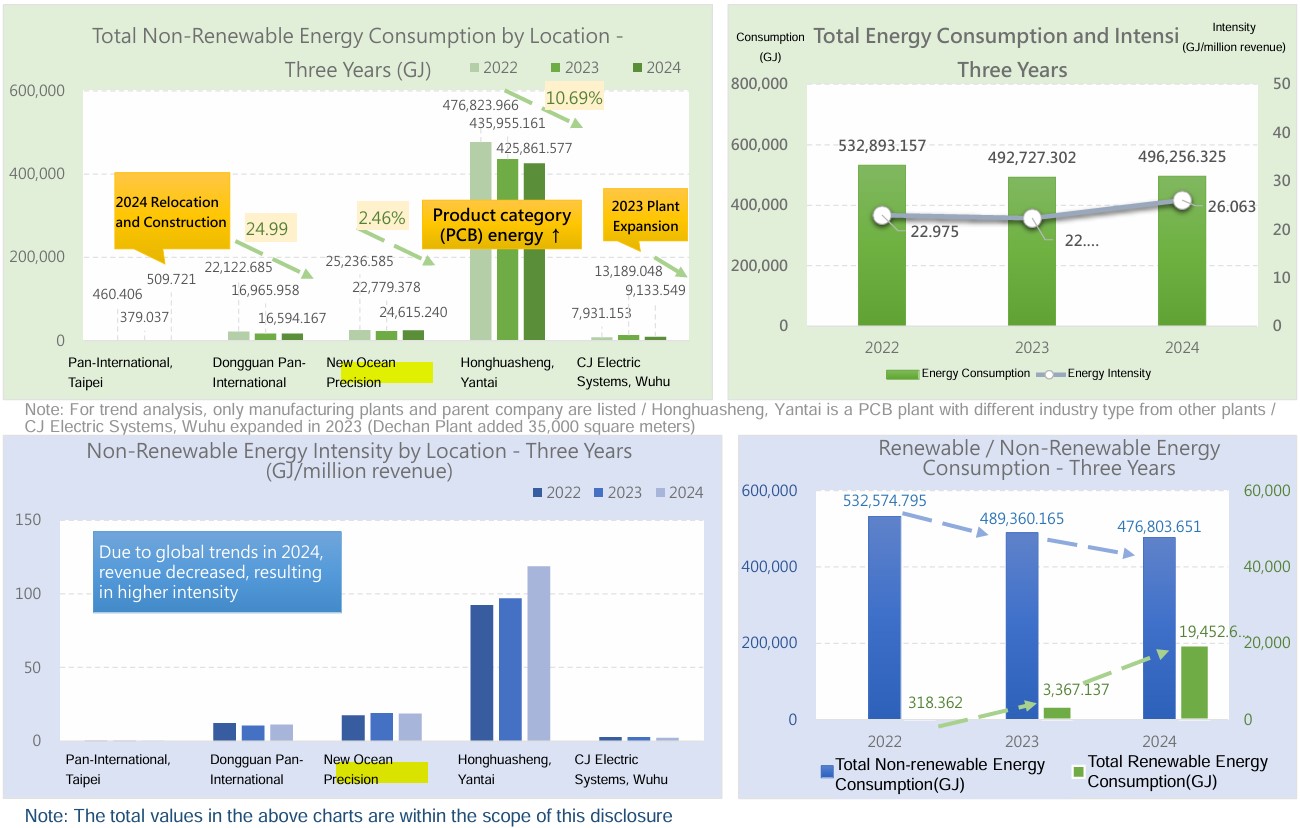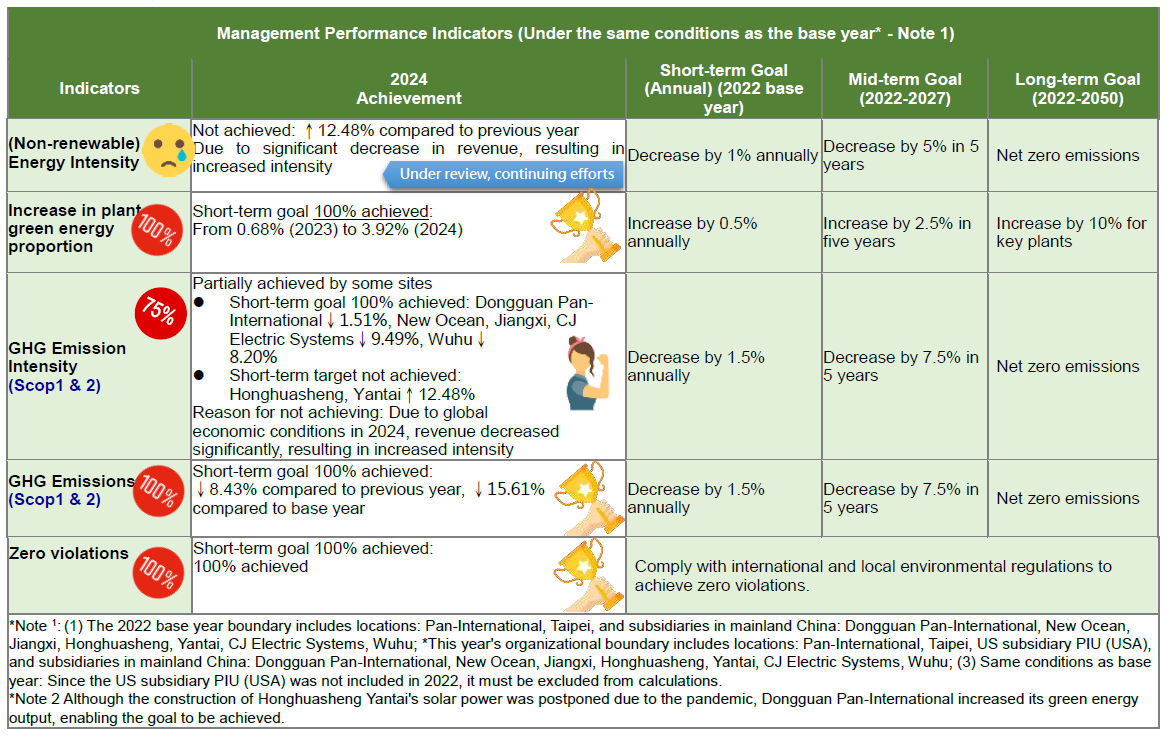
Governance
Sustainability Committee:
The Group has established a management organization for key subsidiaries with production facilities. The Chairman of the Board serves as the Chief Committee Member, overseeing regular (quarterly) discussions on climate change strategies, greenhouse gas (GHG) emissions disclosure, and reduction initiatives. The Committee’s progress and results are reported to the Board of Directors annually.
Climate Management
Since 2022, the Company has adopted the Task Force on Climate-related Financial Disclosures (TCFD) framework to enhance the transparency of its climate-related risk management and financial disclosures.
Energy Management
The Pan-International Group and its subsidiaries primarily rely on purchased electricity, which accounts for over 90% of the total energy consumption. Accordingly, the Group’s energy disclosure and management focus mainly on purchased electricity analysis and reduction measures. Through the Committee, the Company formulates energy-saving and carbon-reduction policies and targets, coordinates subsidiary-level initiatives, and integrates implementation strategies. Regular meetings are held to review progress, introduce new energy-saving projects, and pursue new efficiency milestones. The Taipei Headquarters is also planning to relocate to a new facility built under green building principles to further strengthen energy efficiency. In China, local governments are actively promoting energy structure transformation toward renewable sources such as wind and solar power. As the Group’s plants utilize local electricity, this transition contributes to a partial green power benefit and overall carbon reduction effect.
Enhanced Energy Disclosure:
Since 2023, key subsidiaries in Mainland China (with production facilities) are required to conduct a comprehensive annual energy inventory, covering the 2022 baseline year and including additional energy categories such as thermal energy, natural gas, and fuels (diesel and gasoline).
Greenhouse Gas (GHG) Management
Currently, the Group’s global facilities are not subject to carbon tax or mandatory carbon trading schemes; therefore, past reporting was conducted in compliance with local regulations only. However, in response to the global climate agenda, the Group has established a GHG disclosure and verification roadmap as follows:
Since 2021, Yantai Honghuasheng subsidiary obtained organizational-level GHG emission verification annually (Completed)
Since 2022, Incorporated GHG emission management into the reporting schedule for the parent company and key subsidiaries, with regular reports to the Board (quarterly or annually)
Since 2023, Parent company completed 2022 GHG inventory (Scope 1 & 2) and continues annual verification (Completed)
Since 2023, China subsidiaries completed 2022 GHG inventory (Scope 1 & 2) and continue annual verification (Completed)
Since 2023, New Ocean, Jiangxi obtained organizational-level GHG verification annually (Completed)
Since 2025, Parent company and China subsidiaries (Dongguan, Wuhu) to obtain ISO 14064-1:2018 organizational-level GHG verification (In progress)
Since 2026, Parent company and consolidated subsidiaries to complete 2025 GHG inventory (Planned)
Since 2027, Parent company to complete 2026 GHG verification (Planned)
Since 2028, Consolidated subsidiaries to complete 2027 GHG verification (Planned)
<< For details, please refer to: The latest version of the ESG Sustainability Report Chapter: Environmental Friendly >>

Energy, Climate, Carbon Emissions Management
Impact:
*Energy
1. Energy consumption leads to rising costs, which increases operating expenses
2. Failure to fulfill corporate social responsibility
3. Deduction on company evaluation score
*Greenhouse Gas
1. The gradual increase in greenhouse gas emission pricing
2. Extreme climate events
3. Negative stakeholder feedback
4. Violation of local and international regulations
5. Damage to corporate image
Location:Pan-International, Taipei (Parent Company) / Dongguan Pan-International / New Ocean, Jiangxi / Honghuasheng, Yantai / CJ Electric Systems, Wuhu
Policies or Commitments Established or Followed:Internal Regulations & Government Regulations
Responsible Units:Sustainability Committee / Chairman / Management Committee
Management Actions:
1. Establish Sustainability Committee: Regularly discuss the implementation and planning of work related to climate change, energy issues, and greenhouse gas emission disclosure and reduction, then report the results to the Board of Directors annually/quarterly
2. Inventory and monitor greenhouse gas emissions
3. Set carbon reduction goals and regularly review and improve
Process for Monitoring the Effectiveness of Actions:
1. Sustainability Committee: For key subsidiaries (with production plants), the Group established a management organization chaired by the Chairman, who acts as the Chairperson. The Committee meets regularly (quarterly) to discuss the implementation and planning of work related to climate change, energy issues, and greenhouse gas emission disclosure and reduction, then report the results to and review with the Board of Directors annually/quarterly
2. The Board of Directors supervises
3. The Sustainability Committee formulates and establishes energy conservation and carbon reduction policies and targets, as well as coordinating and integrating related promotion strategies and plans of each subsidiary. Regular meetings are held to continuously introduce various energy-saving plans suitable for different plants, confirm and review goal achievement rates, and challenge new energy-saving milestones
Pan-International Group follows the ISO 14064-1:18 Greenhouse Gas Inventory Standard, adopting the operational control approach to define organizational boundaries. The disclosure scope for 2024 includes Category 1 Direct Emissions, Category 2 Purchased Energy, and Categories 3 to 6 (according to the disclosure requirements of the Climate Change Response Act which replaced the Greenhouse Gas Reduction and Management Act). Categories 2-6 are calculated based on significant materiality assessment results. According to the ISO 14064-1: 2018 standard, significance assessment criteria for indirect greenhouse gas emissions are established (frequency, impact level, quantification method, and risk level). After weighted scoring based on significance identification factors for each emission type, those identified as significant emission types will be prioritized for inventory and emission calculation. The significance assessment of indirect greenhouse gas emissions comes from greenhouse gases generated by each company's operational activities, but these emission sources are not owned or controlled by the respective companies. And verification is conducted by an external third party.
This year's organizational boundary includes all locations within the scope of this sustainability report: parent company, subsidiaries in mainland China, and U.S. subsidiaries. The reporting boundary includes Category 1 direct greenhouse gas emissions: stationary sources, mobile sources, fugitive sources, process sources, etc.; Category 2 purchased energy emissions: electricity and thermal energy; Category 3: upstream transportation, business travel, etc.; Category 4: product purchases, waste disposal, etc.
Within the reporting boundary, major potential greenhouse gas emission sources are identified. The types of greenhouse gases include seven gases: carbon dioxide (CO2), methane (CH4), nitrous oxide (N2O), hydrofluorocarbons (HFCs), perfluorocarbons (PFCs), sulfur hexafluoride (SF6), and nitrogen trifluoride (NF3).
Since 2022, the Group's Taipei parent company and subsidiaries in mainland China (Dongguan Pan-International, New Ocean Precision Component Jiangxi, Honghuasheng Yantai, CJ Electric Systems Wuhu) have conducted annual greenhouse gas inventories, with 2022 serving as the base year (covering Scope 1 and Scope 2). The base year for Scope 3 is set as 2024. The U.S. subsidiary PIU (USA) began conducting inventories in 2023; however, as it is an office location with fewer than 10 people and extremely low carbon emissions, it is not included in the base year calculation scope.
<< For details, please refer to: The latest version of the ESG Sustainability Report Chapter: Environmental Friendly >>
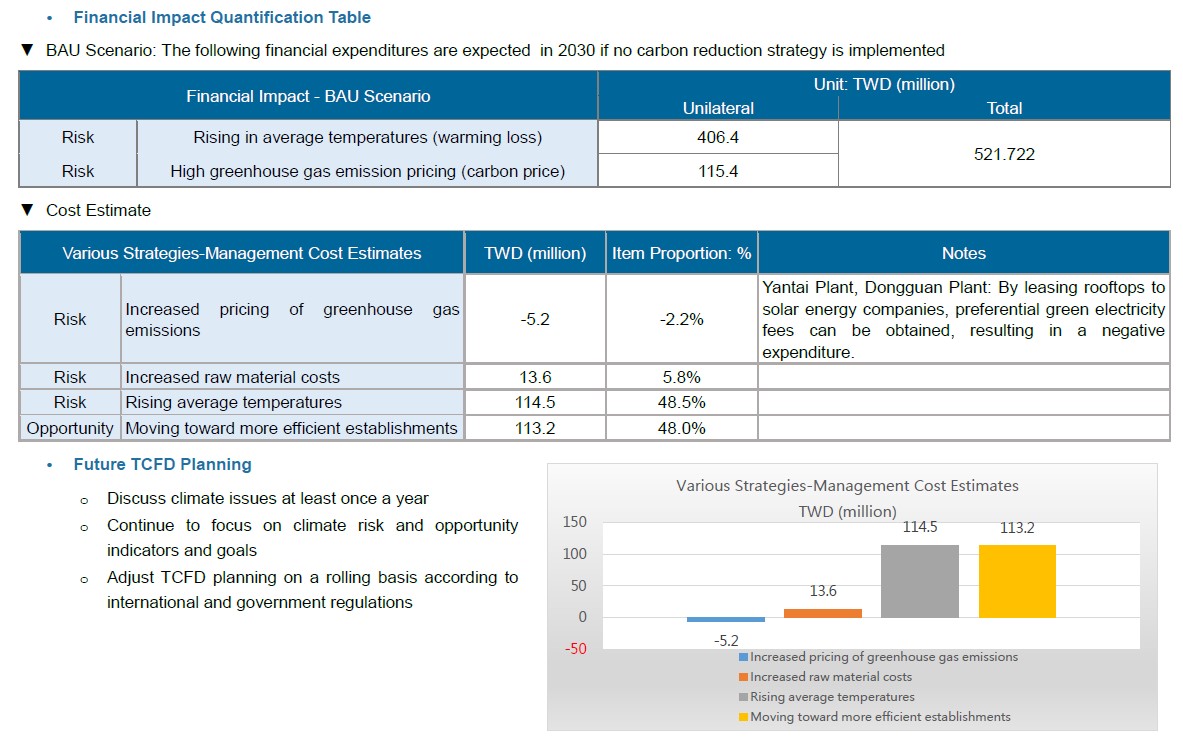
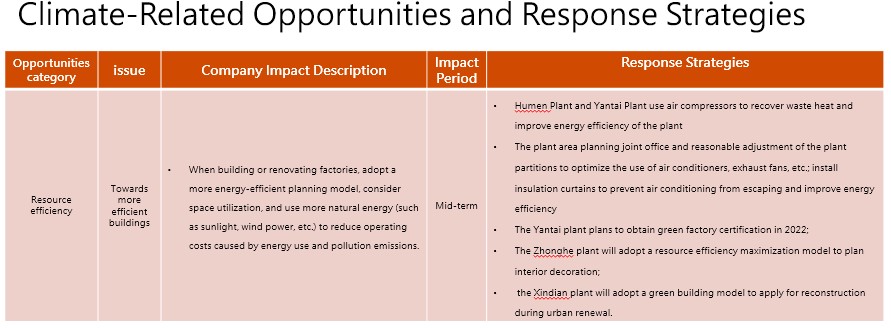
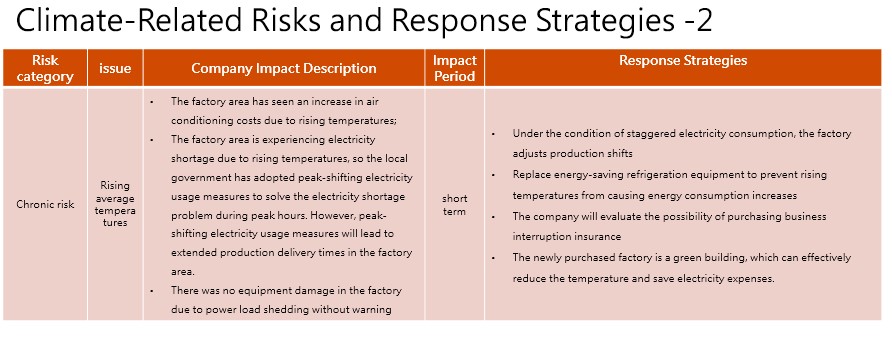
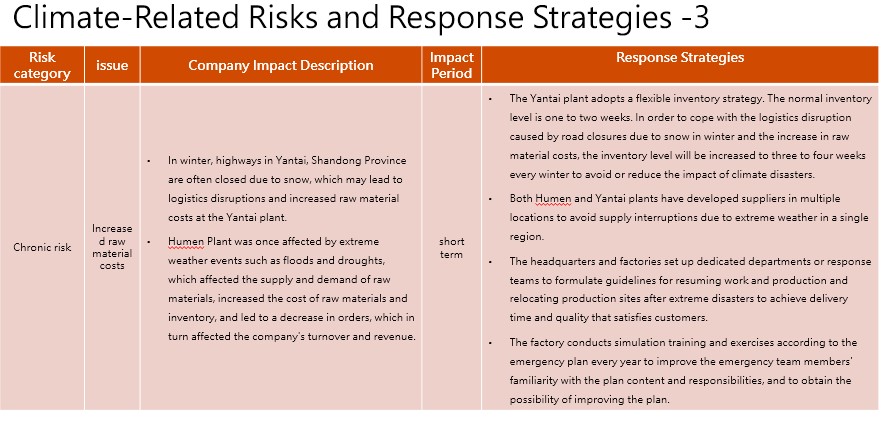
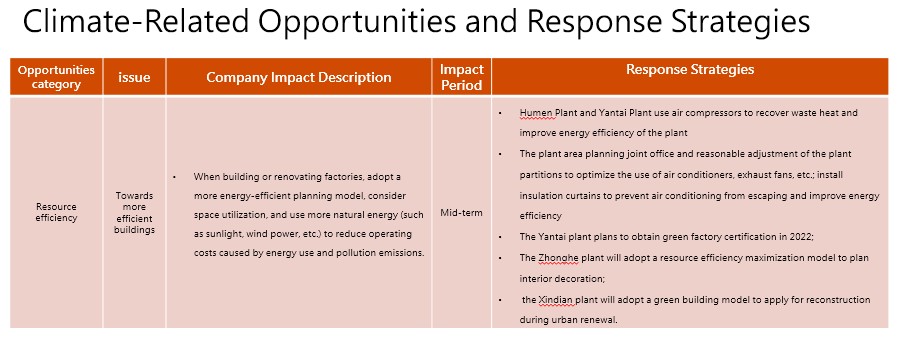
Climate (TCFD)
Climate (TCFD)
-Implemented Task Force on Climate-Related Financial Disclosures starting in 2022.
Climate-Related Financial Disclosures
In response to international trends, as well as regulation, investor, supply chain, and consumer demands on climate issues, Pan-International Group implemented climate-related financial disclosures (TCFD) in 2022 to continue promoting climate governance to achieve low-carbon operations and environmental sustainability.
o Based on the four core elements of climate related financial disclosure: Governance,Governance,” Strategy,Strategy,” Risk Management, Management,” Metrics and Targets.
o Establish a risk framework, identify material risks and opportunities that may impact operations, and propose related respons e strategies.
o Integrate climate change with corporate governance, business strategy, and risk management. Information helps guide t he enterprise s decisions
on climate risk and opportunities, while funding supports the overall transition to low carbon economic development.
o Ultimate goal Enhance competitiveness under low carbon transition.
To ensure robust identification and management of climate-related risks and opportunities, the Sustainability Committee periodically evaluates the climate risks relevant to Pan-International and approves corresponding management actions while overseeing their implementation effectiveness. The Company has also developed targeted response measures to address material climate risks and opportunities, supporting its commitment to resilient and sustainable business operations.
<< For details, please refer to: The latest version of the ESG Sustainability Report Chapter: Corporate Governance/Climate-related Financial Disclosures >>
